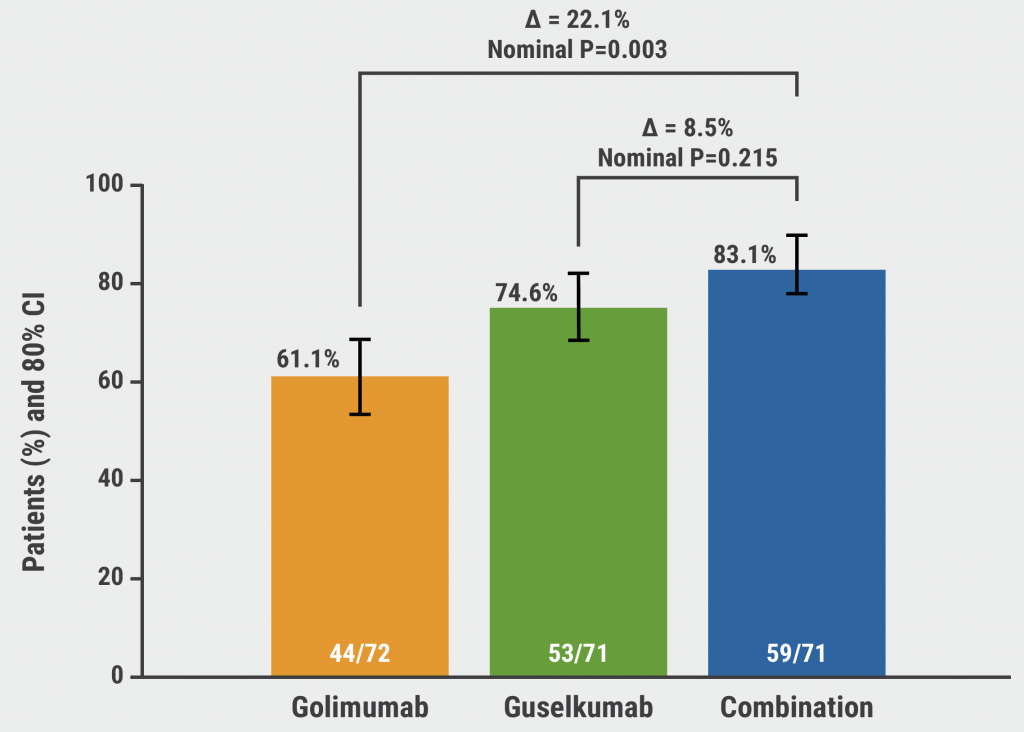Adalimumab is a monoclonal TNF inhibitor long used to treat adults with UC. Earlier this year, the U.S. Food and Drug Administration (FDA) approved its use in children age 5 years and older with moderately to severely active UC.
The ENVISION I study was a phase-3, randomized, double-blind, multicenter study testing high-dose and standard-dose subcutaneously administered adalimumab in 93 children aged 4 to 17 years with moderate to severe UC, defined as a full Mayo score (FMS) of six to 12 with endoscopy subscore of 2 to 3 points, despite stable oral corticosteroid of immunosuppressant therapy.
Per the original study design, children received either high-dose induction adalimumab (2.4 mg/kg, maximum 160 mg, at weeks 0 and 1) or standard-dose induction adalimumab (2.4 mg/kg at week 0 and placebo at week 1); both groups received 1.2 mg/kg (max 80 mg) at week 2 and 0.6 mg/kg (max 40 mg) at weeks 4 and 6.
Children with a partial Mayo score (PMS) response at week 8 (defined as a decrease of 2+ points and a decrease of at least 30% from baseline in PMS) were randomly allocated to high-dose maintenance adalimumab (0.6 mg/kg weekly), standard-dose maintenance adalimumab (0.6 mg/kg every other week), or placebo up to week 52.
A study design change was later introduced that ended random assignment to the maintenance placebo group at week 8 and adalimumab responses were compared against external adult placebo rates.
At week 8, 60% of children in the high-dose adalimumab group and 43% in the standard-dose group achieved clinical remission per PMS (defined as PMS of 2 or less and no individual subscore above 1), compared with an external placebo rate of 19.8%.
At week 52, among week 8 PMS responders, 45% of children in the high-dose group and 29% in the standard-dose group achieved remission per FMS.
The most common adverse events were headache, anemia, and UC flare during the induction period and UC flare, headache, and nasopharyngitis during the maintenance period.
"No new safety signals were observed, suggesting that adalimumab is an efficacious and safe treatment option for children with moderate-to-severe ulcerative colitis," Dr. Nicholas Croft of Queen Mary University of London and colleagues report in The Lancet Gastroenterology and Hepatology.
In a linked Comment, Dr. Kaija-Leena Kolho of Children's Hospital, in Helsinki, Finland, notes that the "hurdle getting available drugs licensed for pediatric use is the extreme complexity of drug trials in children. As a result, there are too few pediatric trials, and many children are treated with off-label use of drugs approved for adults." Therefore, the ENVISION I trial is "more than welcome."
"The study reflects all the problems encountered with pediatric drug trials. At first, there was a placebo group included, but recruitment was extremely difficult when placebo was an option and ethically questionable. According to the study protocol, children with moderate-to-severe ulcerative colitis in the placebo group would not be allowed to have treatment with a drug that has proven effective in adults with the same disease and in children with Crohn's disease. After inclusion of 12 patients in the placebo group, the protocol was changed and use of placebo was ceased," Dr. Kolho points out.
"The ENVISION 1 study confirms that adalimumab is an effective drug in a subgroup of patients with pediatric ulcerative colitis," Dr. Kolho concludes.
"In future studies, searching for markers that would aid in identifying those patients who might respond (or not) to an early course of treatment is warranted. Identifying markers would help in making individual management decisions as the number of available drugs hopefully increases in the near future," Dr. Kolho adds.
The ENVISION I study was funded by AbbVie, which markets adalimumab as Humira. Several investigators have disclosed financial relationships with the company.
SOURCE: https://bit.ly/3dt8I6q and https://bit.ly/3jrx7NC Lancet Gastroenterology and Hepatology, online June 18, 2021.
By Reuters Staff
Posted on
Previous Article
« PCI for chronic total occlusion more successful after coronary CTA Next Article
Elderly heart-failure patients often denied evidence-based therapies »
« PCI for chronic total occlusion more successful after coronary CTA Next Article
Elderly heart-failure patients often denied evidence-based therapies »
Related Articles
August 18, 2021
Certain antibiotics may drive anti-TNF immunogenicity in IBD

© 2024 Medicom Medical Publishers. All rights reserved. Terms and Conditions | Privacy Policy

